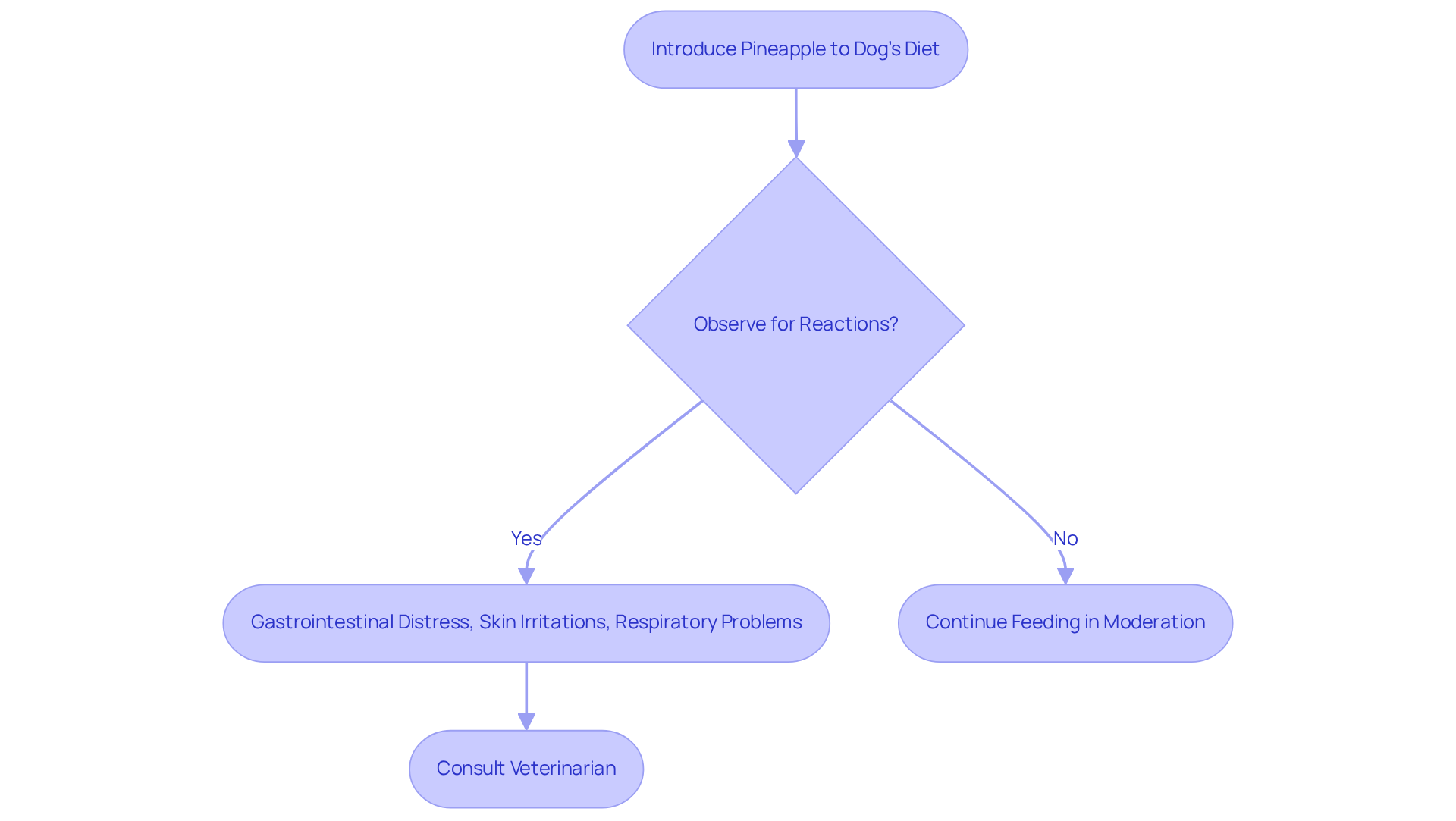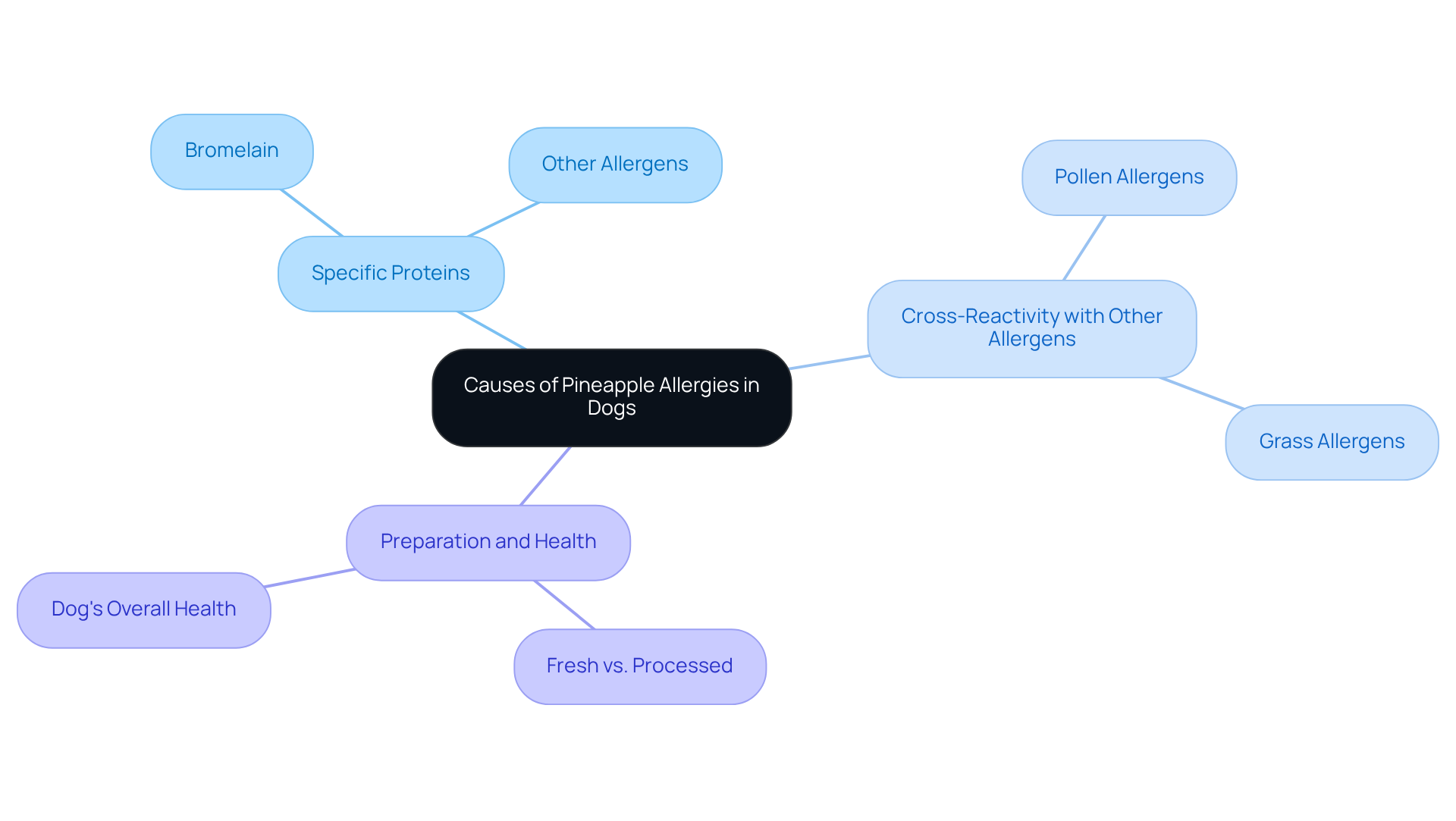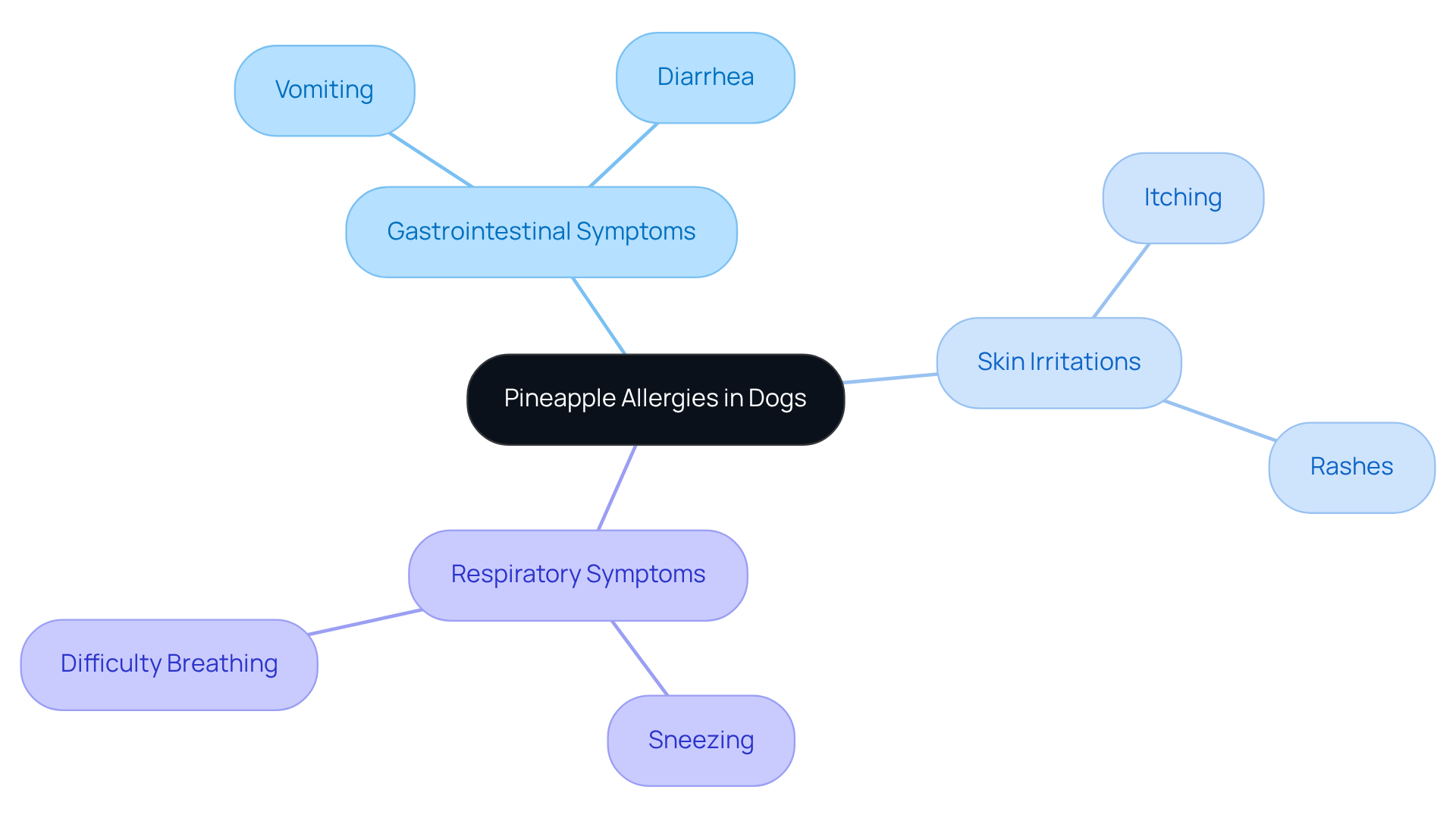

Are Dogs Allergic to Pineapple? Causes and Symptoms Explained
by Lena Park
Last updated: August 13, 2025
Verified and Approved by:
Angela Morris,
MSW, LCSW
Fact Checked

Overview
It’s important to know that dogs can be allergic to pineapple, even though such allergies are relatively rare. If your furry friend does have an allergy, symptoms might include:
- gastrointestinal distress
- skin irritations
- respiratory problems
This can be concerning for any pet owner. The article explains that certain proteins in pineapple may trigger immune responses in sensitive dogs, which can be distressing to witness. Therefore, it’s crucial to keep a close eye on your pet for any adverse reactions when introducing new foods into their diet. Remember, your vigilance can make a significant difference in ensuring your dog’s well-being.
Introduction
The question of whether dogs can be allergic to pineapple is one that many pet owners may ponder, especially as they explore new dietary options for their furry friends. It’s natural to want the best for our beloved companions, and while pineapple can be a nutritious treat, it is essential to understand that some dogs may experience adverse reactions to this tropical fruit. This article delves into the causes, symptoms, and potential consequences of pineapple allergies in dogs, aiming to equip pet owners with the knowledge needed to make informed dietary choices.
What signs should you look for to determine if your cherished canine is reacting negatively to pineapple? How can you ensure your pet enjoys this fruit safely? These are important questions that reflect our deep care for the well-being of our pets.
Can Dogs Be Allergic to Pineapple?
Yes, the question of whether dogs are allergic to pineapple is valid, as canines can indeed be allergic to tropical fruit, although such allergies are relatively uncommon. Like humans, our beloved dogs may develop sensitivities to various foods, including fruits. While the fruit is generally safe for canines when provided in moderation, some may experience allergic responses, which leads to the question: are dogs allergic to pineapple? It’s important to be aware of the typical indicators of fruit sensitivities in dogs, which can include:
- Gastrointestinal distress
- Skin irritations
- Respiratory problems
These symptoms can vary from mild to severe, depending on each dog’s unique immune response.
It’s crucial to mention that canines should only consume the fruit’s inside, avoiding the outer layer, core, and foliage to prevent gastrointestinal blockages. Recent studies suggest that food allergies affect approximately 10% of dogs, with certain breeds being more predisposed to these sensitivities. When introducing a tropical fruit or any unfamiliar food to your dog’s diet, it’s essential to observe your furry friend carefully for any negative reactions, especially to determine if they are dogs allergic to pineapple. Starting with a small portion of fresh fruit can help assess their tolerance, particularly when questioning if dogs are allergic to pineapple, as excessive intake may lead to digestive issues or allergic reactions. Additionally, it’s wise to limit treats to 10% of a dog’s overall diet to maintain balanced nutrition.
If your dog shows signs of discomfort, such as vomiting, diarrhea, or unusual itching, it’s advisable to consult a veterinarian for further guidance. As Dr. Hunter Finn, an integrative veterinary expert, suggests, it’s always best to talk to your vet before adding any human food to your dog’s diet. Interestingly, pineapple may also assist with coprophagia in canines due to the enzyme bromelain, which aids in protein breakdown and nutrient absorption. Remember, being attentive to your pet’s needs and health can foster a stronger bond and ensure their well-being.

Causes of Pineapple Allergies in Dogs
As a pet owner, you might be concerned about whether dogs are allergic to pineapple, as sensitivities in our beloved canines can be linked to various factors. One primary cause of the question of whether dogs are allergic to pineapple is the presence of specific proteins in the fruit that may trigger an immune response in sensitive dogs. Additionally, cross-reactivity with other allergens, such as pollen, can also play a role in this issue.
For instance, dogs with pre-existing sensitivities to certain grasses or trees may find themselves more susceptible to developing food sensitivities, which raises the question of whether dogs are allergic to pineapple. Furthermore, the method of preparation and your dog’s overall health can significantly influence the likelihood of an allergic reaction, making it essential to stay informed and attentive to their needs.

Symptoms of Pineapple Allergies in Dogs
As a loving pet owner, it can be distressing to see your furry friend struggle with health issues. Symptoms of fruit allergies in dogs can vary, and one common concern is whether dogs are allergic to pineapple, often manifesting as gastrointestinal problems such as vomiting and diarrhea, which can be quite alarming. You might also notice skin irritations, like itching, hives, or rashes, that can make your dog uncomfortable. Additionally, some dogs may experience respiratory symptoms, including sneezing or difficulty breathing. If your dog shows any of these signs after eating fruit, it’s crucial to consult a veterinarian to determine if dogs are allergic to pineapple. They can provide the proper diagnosis and treatment, ensuring your beloved companion receives the care they need. Remember, you’re not alone in this—seeking help is a loving step towards your pet’s well-being.

Consequences of Feeding Pineapple to Dogs
Giving this tropical fruit to our beloved canines can lead to both positive and negative outcomes. On the brighter side, this nutrient-dense fruit is packed with vitamins and minerals that can significantly support canine health. It contains Vitamin C, which helps bolster the immune system and reduce inflammation, while manganese plays a vital role in developing strong bones and connective tissues. Moreover, with 82% water content, this fruit serves as an excellent source of hydration, particularly on warm days when our furry friends need it most.
However, we must also be mindful of the risks associated with offering this fruit to our dogs. Some canines may experience allergic reactions, which raises the question of whether dogs are allergic to pineapple, and excessive intake can lead to digestive disturbances, including diarrhea. The high sugar content raises particular concerns for dogs with diabetes, as it can worsen their condition. Therefore, it’s essential for pet owners to introduce the fruit gradually, starting with just two to three small pieces, and to closely monitor their dog’s reaction.
Veterinary experts recommend avoiding canned fruit, commercial varieties, and juice due to the added sugars and preservatives that can be harmful. Instead, fresh fruit should be peeled and sliced into small, bite-sized portions to ensure safety. While pineapple can be a delightful treat for dogs, it should be offered in moderation and not as a regular part of their diet. By taking these thoughtful steps, we can ensure that our pets enjoy the benefits of this tropical fruit while keeping their health and well-being a top priority.

Conclusion
Understanding whether dogs can be allergic to pineapple is vital for ensuring their health and happiness. While such allergies are uncommon, recognizing the potential for sensitivities to this tropical fruit is essential for responsible pet ownership. By being aware of the symptoms and taking precautions when introducing new foods, pet owners can safeguard their furry friends from adverse reactions.
The article highlights several key points, including the symptoms of pineapple allergies in dogs, such as:
- Gastrointestinal distress
- Skin irritations
- Respiratory issues
It also emphasizes the importance of moderation when feeding pineapple, as excessive intake can lead to digestive problems. Additionally, the potential benefits of pineapple, such as hydration and essential nutrients, are discussed, alongside the risks associated with improper preparation and excessive sugar content.
Ultimately, being attentive to a dog’s dietary needs and reactions can strengthen the bond between pet and owner. By consulting with a veterinarian before introducing new foods and observing for any signs of discomfort, pet owners can make informed decisions that prioritize their dog’s well-being. The question of whether dogs are allergic to pineapple serves as a reminder to approach their diets with care and consideration, ensuring a healthy and happy life for our beloved companions.
Frequently Asked Questions
Can dogs be allergic to pineapple?
Yes, dogs can be allergic to pineapple, although such allergies are relatively uncommon. They may develop sensitivities to various foods, including fruits.
What are the typical indicators of fruit sensitivities in dogs?
Typical indicators of fruit sensitivities in dogs can include gastrointestinal distress, skin irritations, and respiratory problems. Symptoms can vary from mild to severe based on each dog’s immune response.
What parts of the pineapple should dogs avoid?
Dogs should only consume the inside of the pineapple and avoid the outer layer, core, and foliage to prevent gastrointestinal blockages.
How common are food allergies in dogs?
Food allergies affect approximately 10% of dogs, with certain breeds being more predisposed to these sensitivities.
How should I introduce pineapple to my dog’s diet?
When introducing pineapple or any unfamiliar food to your dog’s diet, it is essential to start with a small portion of fresh fruit and observe for any negative reactions.
What should I do if my dog shows signs of discomfort after eating pineapple?
If your dog shows signs of discomfort, such as vomiting, diarrhea, or unusual itching, it is advisable to consult a veterinarian for further guidance.
How much of a dog’s diet should treats, including pineapple, make up?
Treats, including pineapple, should be limited to 10% of a dog’s overall diet to maintain balanced nutrition.
Can pineapple have any benefits for dogs?
Pineapple may assist with coprophagia in canines due to the enzyme bromelain, which aids in protein breakdown and nutrient absorption.
Certify Your Emotional Support Animal Today

Why You Can Rely on Us?
At Wellness Wag, we believe your pet deserves care rooted in both science and compassion. Each article is carefully researched, written in clear language for pet owners, and then reviewed by qualified professionals to ensure the information is evidence-based, current, and practical for real-life care. Our goal is to help you feel confident in making informed decisions about your pet’s health and well-being.
Reviewed by
Angela Morris, MSW, LCSW
Angela is a licensed clinical social worker with 20 years of experience in patient advocacy and community mental health. She has assisted numerous clients with ESA evaluations and brings a deep understanding of disability accommodations, ensuring that all information is accurate, supportive, and practical.

Written by :
Lena Park
Last Updated :
August 13, 2025












